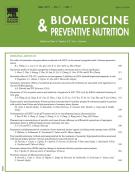Insignificant viability of the granules of probiotic and prebiotic with skimmed milk powder - 23/10/14

Abstract |
Currently, there is an escalating demand of people for probiotic health-based products. Further, the survival of these bacteria in the human gastrointestinal system is questionable. Viability of probiotic in food and food products is a challenge for the food processing industry. Providing probiotic living cells with a physical barrier against adverse environmental conditions is therefore an approach currently receiving considerable interest to achieve longer shelf-life of the product. In the present study, skimmed milk powder along with probiotic (Lactobacillus acidophilus) and prebiotic (Fructooligosaccharide) were used to make granules by wet granulation method and the viability of the granulated probiotic organism was investigated. Results indicated poor survival of the L. acidophilus after granulation. Physico-chemical characteristics of two optimised F1 and F2 formulations were assessed for pH, water holding capacity and moisture content determination. Major future challenges are also spotlighted.
Le texte complet de cet article est disponible en PDF.Keywords : Probiotics, Prebiotics, Skimmed milk powder, Lactobacillus acidophilus, Fructooligosaccharide, Granules
Plan
Vol 4 - N° 4
P. 603-605 - octobre 2014 Retour au numéroBienvenue sur EM-consulte, la référence des professionnels de santé.
L’accès au texte intégral de cet article nécessite un abonnement.
Déjà abonné à cette revue ?

